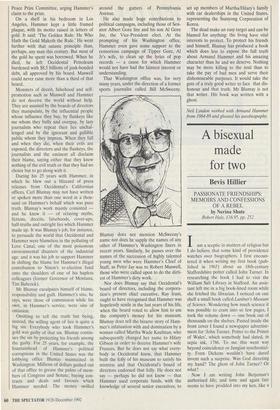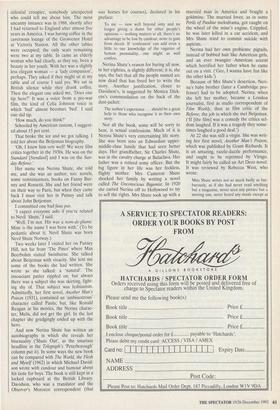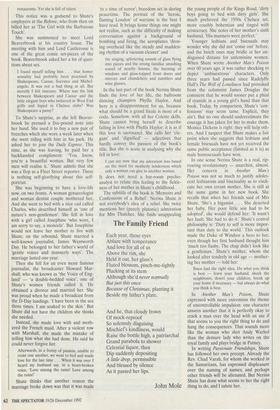A bisexual made for two
Bevis Hillier
PASSIONATE FRIENDSHIPS: MEMOIRS AND CONFESSIONS OF A REBEL by Nerina Shute Robert Hale, £16.95, pp. 252
Iam a sceptic in matters of religion but I do believe that some kind of providence watches over biographers. I first encoun- tered it when writing my first book (pub- lished in 1965) about an 18th-century Staffordshire potter called John Turner. In researching the book I had to visit the William Salt Library in Stafford. An assis- tant left me in a big book-lined room while she fetched the librarian. I noticed on one shelf a small book called Lardner's Museum of Science. Wondering how much science it was possible to cram into so few pages, I took the volume down — one book out of thousands on the shelves. Pasted inside the front cover I found a newspaper advertise- ment for 'John Turner, Potter to the Prince of Wales', which somebody had dated, in sepia ink, 1786. To me this went way beyond coincidence or Jungian synchronici- ty. Even Dickens wouldn't have dared invent such a surprise. Was God directing my hand? The ghost of John Turner? Or what?
Now I am writing John Betjeman's authorised life; and time and again fate seems to have prodded into my ken, like a celestial croupier, somebody unexpected who could tell me about him. The most uncanny instance was in 1988, shortly after I had returned to England after almost five years in America. I was having coffee in the cavernous lounge of the Grosvenor Hotel at Victoria Station. All the other tables were occupied; the only seats remaining were two at my table. In came an elderly woman who had clearly, as they say, been a beauty in her youth. With her was a slightly less elegant woman — a 'lady companion', perhaps. They asked if they might sit at my table and of course I said yes. We sat in British silence while they drank coffee. Then the elegant one asked me, 'Does one tip here?' It was a voice from a pre-war film, the kind of Celia Johnson voice in which `bad' almost becomes 'bed'. I said one did tip.
'How much, do you think?'
Schooled by American custom, I suggest- ed about 15 per cent.
That broke the ice and we got talking. I told her about the Betjeman biography.
'Oh, I knew him very well! We were film critics together in the 1930s. He was on the Standard [Stendard] and I was on the Sun- day Referee.'
Her name was Nerina Shute, she told me, and she was an author, too: novels, some reminiscences, books on Fanny Bur- ney and Rossetti. She and her friend were on their way to Paris, but when they came back I must visit her in Putney and talk about John Betjeman.
I committed one bad faux pas.
'I expect everyone asks if you're related to Nevil Shute,' I said.
'Well, I'm not. His was a nom-de-plume. Mine is the name I was born with.' (To be pedantic about it, Nevil Shute was born Nevil Shute Norway.) Two weeks later I visited her on Putney Hill, not far from The Pines' where Max Beerbohm visited Swinburne. She talked about Betjeman with vivacity. She lent me some of the books she had written. She wrote as she talked: a 'natural'. The insouciant patter rippled on; but always there was a subject she was skirting, fight- ing shy of. That subject was lesbianism. Admittedly, her first novel, Another Man's Poison (1931), contained an `ambisextrous' character called Paula; but, like Ronald Reagan in his movies, the Nerina charac- ter, Melis, did not get the girl. In the last chapter she grudgingly ended up with the hero.
And now Nerina Shute has written an autobiography in which she reveals her bisexuality ('Shute Out', as the smartass headline in the Telegraph's `Peterborough' column put it). In some ways the new book can be compared with The World, the Flesh and Myself (1962) in which Michael David- son wrote with candour and humour about his taste for boys. The book is still kept in a locked cupboard at the British Library. Davidson, who was a translator and the Observer's Morocco correspondent (that was horses for courses), declared in his preface:
To me — now well beyond sixty and no longer giving a damn for other people's opinions — nothing matters at all, there's no advantage to be lost by candour, none to gain from deceit. If 'confession' can add even a little to our knowledge of the vagaries of human personality, one might as well confess.
Nerina Shute's reason for baring all now, in her eighties, is slightly different; it is, she says, the fact that all the people named are now dead that has freed her to write the story. Another justification, closer to Davidson's, is suggested by Monica Dick- ens's commendation on the back of the dust-jacket:
The author's experience ... should be a great help to those who recognise it as their own story.
Not all the book, some will be sorry to hear, is sexual confessions. Much of it is Nerina Shute's very entertaining life story. She was born into an Edwardian upper- middle-class family that had seen better days. Her grandfather, Sir Charles Shute, was in the cavalry charge at Balaclava. Her father was a retired army officer. But the big figure in her life was her feckless, flighty mother. Mrs Cameron Shute shocked her family by writing a novel called The Unconscious Bigamist. In 1920 she carted Nerina off to Hollywood to try to sell the rights. Mrs Shute took up with a married man in America and bought a goldmine. The married lover, as in some Perils of Pauline melodrama, got caught on the wheel of the mine's engine. Crippled, he was later killed in a car accident, and Mrs Shute tried to commit suicide with aspirins.
Nerina had her own problems: pigtails, instead of bobbed hair like American girls, and an ever twangier American accent which horrified her father when he came out on a visit. ('Gee, I wanna have fun like the other kids.')
Because of Mrs Shute's desertion, Neri- na's baby brother (later a Cambridge pro- fessor) had to be adopted. Nerina, when she left her mother, became a London journalist, first as studio correspondent of Film Weekly, then as film critic of the Referee, the job in which she met Betjeman. (If [the film] was a comedy the critics sel- dom laughed. If it was a tragedy they some- times laughed a good deal.') At 22 she was still a virgin. She was writ- ing her first novel, Another Man's Poison, which was published by Grant Richards. It is an amazing, razzle-dazzle performance, and ought to be reprinted by Virago. It might fairly be called an Art Deco novel. It was reviewed by Rebecca West, who wrote:
Miss Shute writes not so much badly as bar- barously, as if she had never read anything but a magazine, never seen any picture but a moving one, never heard any music except at restaurants. Yet she is full of talent.
This notice was a godsend to Shute's employers at the Referee, who from then on billed her as 'The Girl with the Barbarous Touch'.
She was summoned to meet Lord Beaverbrook at his country house. The meeting with him and Lord Castlerosse is one of the great comic set-pieces of the book. Beaverbrook asked her a lot of ques- tions about sex.
I found myself telling him . . . that homo- sexuality had probably been practised by Shakespeare, Caesar, Socrates and Michel- angelo. It was not a bad thing at all. But secretly I felt insecure. Where was the link between Shakespeare and Caesar and the little elegant boys who twittered in West End grills and lisped in Chelsea clubs? Was Shakespeare a pansy?
To Shute's surprise, as she left Beaver- brook he pressed a five-pound note into her hand. She used it to buy a new pair of breeches which she wore a week later when she went riding with him in his park. He asked her to join the Daily Express. This time, as she was leaving, he paid her a backhanded compliment: 'You know, you're a beautiful woman. But very few men will realise it.' Shute admits that she was a flop as a Fleet Street reporter. There is nothing self-glorifying about this self- portrait.
She was beginning to have a love-life now, on two fronts. A woman gynaecologist and woman dentist couple mothered her. And she went to bed with a nice cad called Charles, who described himself as 'one of nature's non-gentlemen'. She fell in love with a girl called Josephine 'who wore, I am sorry to say, a monocle'. But Josephine would not leave her mother to live with Shute; on the rebound, Shute married a well-known journalist, James Wentworth Day. He belonged to her father's world of 'gentle voices and mannerly ways'. The marriage lasted one year.
Then she fell for an even more famous journalist, the broadcaster Howard Mar- shall, who was known as 'the Voice of Eng- land' — 'a double-bedded voice', one of Shute's women friends called it. He obtained a divorce and married her. She was proud when he made a broadcast from the D-Day landings. have been in the sea three times. I am soaked to the skin.' But Shute did not have the children she thinks she needed.
Instead, she made love with and moth- ered the French maid. After a violent row with Marshall, she made the mistake of telling him what she had done. He said he could never forgive her.
Afterwards, in a frenzy of passion, unable to resist one another, we went to bed and made love for the last time . . . When it was over I heard my husband say, in a heart-broken voice, 'Love among the ruins! Love among the ruins!'
Shute thinks that another reason the marriage broke down was that it was made
'in a time of terror'; boredom set in during peacetime. The portrait of the 'heroic, flaming London' of wartime is the best I have read. It brings home things one might not realise, such as the difficulty of making conversation against a background of bombing and firing, the aeroplanes 'dron- ing overhead like the steady and madden- ing rhythm of a vacuum cleaner' and
the singing, splintering sounds of glass flying into pieces and the strong familiar smashing sound of nearby houses, the bursting of windows and glass-topped front doors and mirrors and chandeliers and tumblers and wine glasses.
In the last part of the book Nerina Shute finds the love of her life, the ballroom dancing champion Phyllis Haylor. And here is a disappointment for us, because what should be a grand finale is more of a coda. Somehow, with all her Colette skills, Shute cannot bring herself to describe falling in love with Phyllis Haylor: it is as if this love is sacrosanct. She calls her 'ele- gant' and 'dignified' — adjectives that hardly convey the passion of the book's title. But she is acute in analysing why she fell in love:
I can see now that my adoration was based on the need for motherly tenderness which only a woman can give to another woman. It does not need a bar-room psycho- analyst to relate this feeling to the fickle- ness of her mother in Shute's childhood. The subtitle of the book is 'Memoirs and Confessions of a Rebel'. Nerina Shute is not everybody's idea of a rebel. She twice mentions her (purely platonic) admiration for Mrs Thatcher. She finds unappealing
the young people of the Kings Road, 'dirty boys going to bed with dirty girls'. She much preferred the 1950s Chelsea set, more couthly bohemian and tinged with aristocracy. She notes of her mother's sixth husband, 'His manners were perfect.'
Younger lesbians and bisexuals may wonder why she did not 'come out' before, and the butch ones may bridle at her un- disguised distaste for unfeminine women. When Shute wrote Another Man's Poison over 60 years ago, it was rather shocking to depict `ambisextrous' characters. Only three years had passed since Radclyffe Hall's The Well of Loneliness had provoked from the columnist James Douglas the comment that he would sooner put a phial of cyanide in a young girl's hand than that book. Today, by comparison, Shute's 'con- fessions' may seem tame. Explicit, they ain't. But no one should underestimate the courage it has taken for her to make them. Monica Dickens is right: they will help oth- ers. And I suspect that Shute makes a fair point when she suggests that lesbians and female bisexuals have not yet received the same public acceptance (limited as it is) as male homosexuals have won.
In one sense Nerina Shute is a real, rip- roaring revolutionary — anarchist, almost. Her concern in Another Man's Poison was not so much to justify adoles- cent lesbianism and bisexuality as to vindi- cate her own errant mother. She is still at the same game in her new book. She recalls that when her friends said of Mrs Shute, 'She's a bigamist . . . She deserted her baby. Her poor little son had to be adopted', she would defend her: 'It wasn't her fault. She had to do it.' Shute's central philosophy is: 'Duty to self is more impor- tant than duty to the world.' This outlook made the Duke of Windsor a hero to her, even though her first husband thought him 'much too flashy. The chap didn't look like a gentleman.' Shute's mother, whom she looked after tenderly in old age — mother- ing her mother — told her:
Ibsen had the right idea. Do what you think is best — leave your husband, shock the neighbours, desert your children, break up your home if necessary — but always do what you think is best.
In Another Man's, Poison, Shute expressed with more extremism the theme of uncontrollable impulsion: one character assures another that it is perfectly okay to crack a man over the head with an axe if that seems to you the right thing to do and hang the consequences. That sounds more like the woman who shot Andy Warhol than the demure lady who writes on the royal family and plays bridge in Putney.
In writing Passionate Friendships, Shute has followed her own precept. Already the Rev. Chad Varah, for whom she worked in the Samaritans, has expressed displeasure over the naming of names; and perhaps other friends will be alienated. But Nerina Shute has done what seems to her the right thing to do, and I salute her.












































































































 Previous page
Previous page